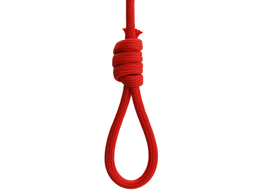
August 28, 2014

Source: Shutterstock
I noticed a fair few mentions of the phrase “death penalty” from UK news outlets last fortnight; little surprise, given that the antepenultimate Wednesday marked the half-century since this Sceptered Isle’s last execution. No doubt, papers and petabytes were packed with philippics decrying the dead and deadly practice (at least the broadsheet-based brands). Can”t say I paused to check, agreement aside.
That said, one editorial succeeded at snagging my attention two weekends ago. Written by no less than the notorious Nigel Farage, the Independent Voices piece put forward the perspective of the UKIP leader in terms both clear and concise; whilst personally opposed to capital punishment, he wishes to see it put to a vote in the name of “sovereignty” and “direct democracy.” To buttress his point, he cited public opinion polls, as well as the words of fellow UKIPer Louise Bours.
I first and last saw Bours back in May on BBC’s Question Time, where she castigated “brains in [his] feet” footballer Joey Barton for his “offensive” likening of British political parties to “four really ugly girls” (thereby making a point of missing the point”and the joke”in tragicomic fashion). Bours” boorishness found fresh vent on the aforementioned Wednesday, with her calls for the culling of cop and kiddy-killers along with the heads of those who severed that of Fusilier Lee Rigby. In a recent YouGov poll, 45 percent of respondents echoed her bilious bloodlust, outstripping the 39 percent opposed to such measures.
For me, such outcries do nothing beyond reinforcing my already low opinion of demagogues and demos alike.
Whilst not exactly the bleeding-heart type, I find myself at odds with the death penalty for reasons similar to Farage’s; the potential for questionable and mistaken executions looms too large on my mind for me to think a reintroduction anything other than a bad idea, and a posthumous pardon strikes me as a pathetic substitute for getting it right the first time. Yes, Mr. Legislator, I”m sure the Bentleys, Tibbses, and Evanses (no longer) of this world will be absolutely thrilled by the news of their exonerations! Such gestures, however, do nothing to dry the tears of poor Bill Blackstone.
With Blackstone’s ratio in mind, who would be eager to endorse the state wielding such power over life and death, especially in a land where trial by hearsay becomes increasingly attractive in the wake of Paedogeddon panic? With populists often advocating the death penalty for rapists and pedophiles, and femorrhoids declaring the presumption of innocence and the attention given to bogus allegations to be merely symptoms of “rape culture,” what would the state of play be if UK legislators reintroduced capital punishment? With such a toxic cultural mash making assaults on basic procedural justice, I suspect lowering the noose into the mix could prove especially … asphyxiating.
Of course, the very presence of a democratic framework increases the prospect of such a sorry state of affairs taking shape in the UK. As such, I think Farage errs to the extent that he indulges”lionizes“what Padraig Deignan calls “the counting of heads, not what’s in them.” Were I to sit down with him, I”d honestly have to ask the bloke what the hell he sees in the big D. Whilst it may not be so awful in small doses (a pub-round allocation here, a group movie choice there), on a scale larger than a gang of mates, the damn thing proves at best a disappointment, at worst a ballot box of disaster; the fact that the average Brit, Westerner, global villager pays at least lip service to it, mistaking it for the apex of freedom and civilization, makes matters all the more exasperating.
“Why rip on democracy so much?” you might ask. Because, dear reader, it amounts to a low-intensity assault on the very concepts it ostensibly symbolizes in the minds of modern men. In the name of equality, the disciples of democratism declare the word of the simpleton as valid as that of the sage, proclaiming him not only fit to run his own affairs, as would be agreeable, but also those of the latter. Indeed, such overreaching arrogance finds itself recast as “self-rule,” obscuring its invasive and predatory nature to all but the most perceptive.
In short, democratists sell their constituents the snake oil that their freedom lies with the ballot rather than beyond it.
Some may counter by invoking the (classical) liberal traditions prevalent, to some degree or other, in Western democracies; however, to the extent that such survive, they do so not because of democracy but in spite of it; a result of determined minorities asserting them against “the will of the people.” Over time, many of these liberties find themselves eroded, courtesy of vote-whoring politicos and the droves who elect them; cartas and constitutions can only stand against the unceasing juggernaut of the popular will for so long.
Under the “direct democracy” Farage favors, things would be ever the more brazen, with peaceful yet unpopular minorities easily oppressed on grounds of color, creed, conduct, or plain circumstance. Just ask Socrates, the girls at Salem, or preceding generations of American blackfolk; more recently, ask white Zimbabweans, if not the more marital-minded queerfolk who endured Proposition 8 in California.